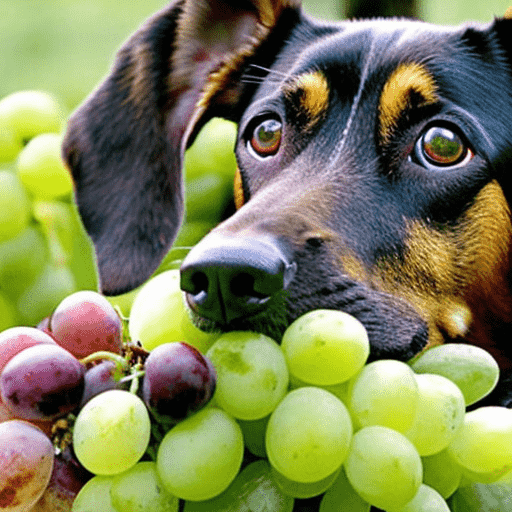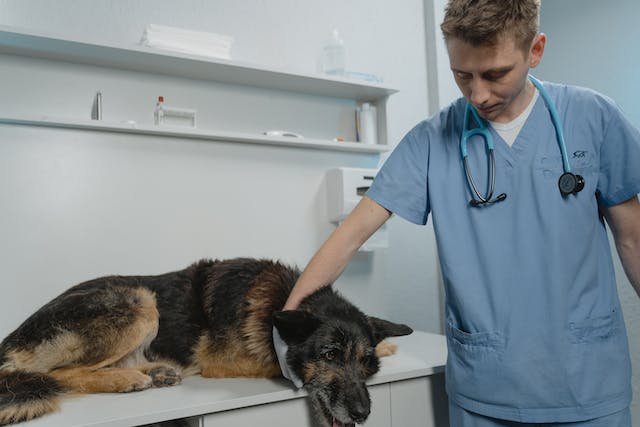
Having a furry friend brings us immense happiness, and as responsible pet owners, we work hard to give them the finest diet and care possible. But despite all of the knowledge that is accessible, one question remains: Can dog eat grapes? The seemingly innocuous fruit has caused debate among doctors and pet owners. We will examine the dangers of grape consumption for dogs in this extensive blog, including the research underlying the toxicity, warning signs, and safe substitutes to protect your dog’s health.
Table of Contents
can dog eat grapes?
Getting to Know the Grape Dilemma:

Red or green grapes have long been regarded as a healthful and nourishing snack for people. Rich in natural sugars, vitamins, and antioxidants, they are a delightful addition to our diets. Nevertheless, things become worse when it comes to our four-legged friends.
The main issue with grapes and dogs is that they can seriously harm the kidneys, which can result in renal failure. Since the precise chemical causing this toxicity is yet unknown, it is difficult to pinpoint the precise amount that is dangerous. For this reason, it’s important to err on the side of caution and keep your dog away from grapes completely.
The Scientific Basis of Dog Grape Toxicity:
Although there is still no obvious explanation for grape toxicity in dogs, a number of theories have been put out. There is a common idea that something in grapes, perhaps a mycotoxin or a pesticide, causes bad reactions in some dogs. According to a different notion, the fruit could have chemicals that, when digested by the dog, produce toxins that are bad for the kidneys.
There is still more research to be done in this area, but the absence of a conclusive solution emphasizes the need for caution. This problem is exacerbated by the fact that different dogs respond differently to grapes; some may eat them and not seem to become sick, while others may have serious problems.
Symptoms of Grape Toxicity in Dogs:

Recognizing the symptoms of grape toxicity is important for prompt intervention. Symptoms may not appear immediately after ingestion and often take hours or days to become apparent.
Common symptoms include:
1. Vomiting
2. Diarrhea
3. Lethargy
4. Loss of appetite
5. Abdominal pain
6. Dehydration
Oliguria (reduced urine output) Your dog is suspected of eating grapes and any of these symptoms are observed If so, please consult a veterinarian immediately. Kidney failure can be fatal, and early detection greatly increases the chances of successful treatment.
The importance of seeking immediate veterinary attention:
Grape toxicity in dogs is considered an emergency to your veterinarian. If you suspect your dog has swallowed grapes or are exhibiting worrying symptoms, don’t wait until the situation worsens. Contact your veterinarian or local animal poison control center immediately. Time is of the essence in mitigating the effects of grape toxicity.
Your veterinarian may provide supportive measures such as inducing vomiting, administering activated charcoal to limit further ingestion of toxins, and intravenous fluids to flush out the kidneys. Regular monitoring of kidney function with blood tests is very important during the recovery process.
Safe Alternatives to Dog Treats:

Given the potential risks associated with grapes, we recommend looking for safe alternatives for treating your dog. Incorporating lots of fruits and vegetables into your dog’s diet will provide both nutritional value and a delicious reward.
Safe options are:
1. Apples (seedless and with core)
2. Blueberries
3. Strawberries
4. Watermelon (seedless)
5. Carrots
6. Sweet potatoes (cooked, unseasoned)
7. Pumpkin (plain or canned)
Always consult your veterinarian before adding any new foods to your dog’s diet, especially if he has any health problems or dietary restrictions.
Pet Owner Education:
The lack of a definitive answer regarding grape toxicity for dogs highlights the importance of education within the pet owner community. Being aware of potential dangers and taking precautions are important steps to protect our four-legged friends.
Pet owners should be informed about the risks associated with certain foods and the need for a pet-friendly environment. This includes securing trash cans, keeping potentially harmful substances out of reach, and being careful when sharing human food with pets, even if it seems harmless.
.
Conclusion:
The answer to the question “Can dog eat grapes?“ Should be a resounding “no.” Grapes can cause serious kidney damage, and a lack of clear understanding of the toxic compounds makes grapes a dangerous choice for dogs to ingest. As responsible pet owners, it is our duty to prioritize our dogs’ health by staying informed, vigilant, proactive, and providing a safe and nurturing environment.
By avoiding grapes and choosing veterinarian-approved alternatives, you can help your furry friends live happy, healthy lives free from the risks associated with potentially harmful foods. When in doubt, always consult your veterinarian to make informed decisions about your dog’s diet and general care.
Having a furry friend brings us immense happiness, and as responsible pet owners, we work hard to give them the finest diet and care possible. But despite all of the knowledge that is accessible, one question remains: Can dog eat grapes? The seemingly innocuous fruit has caused debate among doctors and pet owners. We will examine the dangers of grape consumption for dogs in this extensive blog, including the research underlying the toxicity, warning signs, and safe substitutes to protect your dog’s health.
Can dog eat grapes?
1. Q: Can I feed my dog a small amount of grapes without any harmful effects?
A: No, it is not recommended to feed dogs any amount of grapes. The toxicity of grapes in dogs is unpredictable, and even a small quantity can lead to severe kidney damage. It’s better to be safe and choose alternative, vet-approved treats.
2. Q: What should I do if my dog accidentally eats grapes?
A: If you suspect your dog has ingested grapes or shows any symptoms of grape toxicity such as vomiting, diarrhea, or lethargy, contact your veterinarian immediately. Time is crucial in treating grape toxicity, and early intervention significantly improves the chances of a positive outcome.
3. Q: Are all dog breeds equally susceptible to grape toxicity?
A: While the exact reasons behind grape toxicity in dogs are not fully understood, it appears that individual sensitivity varies. Some dogs may consume grapes without apparent harm, while others may experience severe reactions. However, given the potential risks, it’s advisable to avoid grapes for all breeds.
4. Q: Are raisins as harmful as grapes for dogs?
A: Yes, raisins are dried grapes and carry the same risk of toxicity. The concentrated nature of raisins can make them even more hazardous. It’s crucial to keep all grape products, including raisins and currants, away from your dog to prevent potential harm.
5. Q: What are safe alternatives to grapes for treating my dog?
A: There are several safe and nutritious alternatives to grapes that you can offer your dog, including apples (seedless and core removed), blueberries, strawberries, watermelon (seedless), carrots, sweet potatoes (cooked and unseasoned), and pumpkin (plain, canned). Always consult with your veterinarian before introducing new foods into your dog’s diet.

One Reply to “can dog eat grapes?”